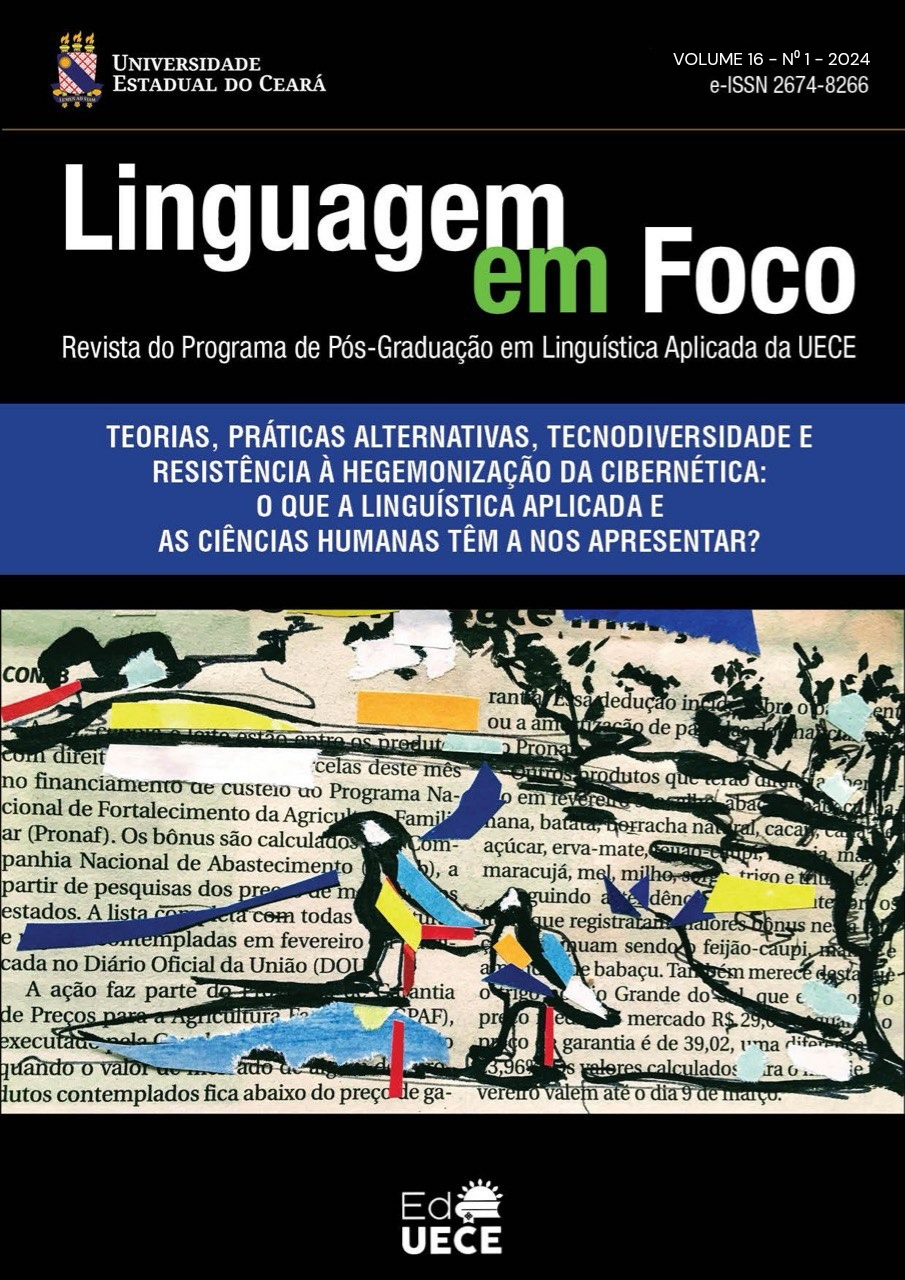Face monetizada
um ensaio sobre os conceitos de face e polidez no contexto
DOI:
https://doi.org/10.46230/2674-8266-15-12108Palavras-chave:
face, positividade, rede socialResumo
O conceito de face ganhou bastante destaque nos estudos sociológicos e linguísticos, especialmente na área da pragmática e sociolinguística interacional. Postulado na década de sessenta, e embora coerente com a atualidade, o conceito não abriga as características das interações da pós-modernidade. Portanto, este texto tem como objetivo atualizar o conceito de face relacionando-o aos estudos da polidez e da positividade na performance do “eu” em interações das redes sociais. Proponho que a face positiva, em tempos de capitalismo tardio, seja considerada uma face essencialmente positivada, a começar pela essência individualista do paradigma de polidez, que, talvez influenciados também pelo contexto histórico e social da época se permitiram vislumbrar um conceito tão alinhado com a perspectiva já apontada. Para isto, foi realizada uma revisão bibliográfica que incluiu os estudos de Goffman (1963a;1963b;1967;1975), Brown e Levinson (1987), Bourdieu (2010), Brinkmann (2022), Cabanas e Illouz (2022), Han (2019), Ortega e Gasset (1962), Barros (2011), Recuero (2009), Strömquist (2023), entre outros. Considerando o contexto do capitalismo tardio e da intensificação das interações sociais através das redes sociais da internet, defendo que a face é monetizada, sendo ela essencialmente positivada por meio de uma fluidez inerente variando conforme o contexto e o nicho interacional.
Downloads
Referências
ADORNO, T. W. A Indústria Cultural. In: COHN, G. Comunicação e indústria cultural. São Paulo: Nacional; Editora da Universidade de São Paulo, 1971.
AUSTIN, J. L. Quando dizer é fazer: palavras e ação. Porto Alegre: Artes Médicas, 1990.
ANDERSON, M. E-mpoliteness: creative impoliteness as an expression of digital social capital. Journal of Politeness Research. 2023. Disponível em https://www.degruyter.com/document/doi/10.1515/pr-2022-0009/html. Acesso em: 09 fev, 2024.
BARROS, D. L. P, de. (Org.). Preconceito e intolerância: reflexões lingüístico discursivas. São Paulo: Universidade Presbiteriana Mackenzie, 2011.
BELL, A. Language style as audience design. Language in Society, New Zeland, v.13, n. 2, p.145-204, jun. 1984.
BOURDIEU, P. O poder simbólico. Rio de Janeiro: Bertrand Brasil, 2010.
BRINKMANN, S. Positividade tóxica. Rio de Janeiro: Best Seller, 2022.
BROWN, P.; LEVINSON, S. Politeness: some universals in language usage. Cambrige: University Press, 1987.
BUTLER, J. Discurso de ódio: uma política do performativo. São Paulo: Editora Unesp, 2021.
CABANAS, E.; ILLOUZ, E. Happycracia: fabricando cidadãos felizes. São Paulo: Ubu editora, 2022.
CAILLOIS, R. Os jogos e os homens: a máscara e a vertigem. Lisboa: Cotovia, 2001.
CRARY, J. 24/7: Capitalismo tardio e os fins do sono. São Paulo: Ubu Editora, 2016.
ECKERT, P. Language Variation as social Practice. Oxford: Blackwell, 2000.
ELLIS, A. Psychotherapy techniques for use with psychotics. American Journal of Psychotherapy. v. 9, n. 3, p. 452-476, 1955. Disponível em: https://psychotherapy.psychiatryonline.org/doi/abs/10.1176/appi.psychotherapy.1955.9.3.452?journalCode=apt. Acesso em: 23 ago, 2023.
GIRARD, R. Anorexia e desejo mimético. São Paulo: É realizações, 2011.
GOFFMAN, E. Behavior in public places: notes on the social organization of gatherings. New York: Free Press, 1963a.
GOFFMAN, E. Estigma: notas sobre a manipulação da identidade deteriorada. Nova Jersey: Prentice-Hall, 1963b.
GOFFMAN, E. Interaction ritual: essays on face-to-face behavior. Garden City: Anchor Doubleday, 1967.
GOFFMAN, E. A representação do Eu na vida cotidiana. Petrópolis: Vozes, 1975.
GOFFMAN, E. Forms of talk. Pennsylvania: University of Pennsylvania Press, 1981.
HAN, B. C. A salvação do belo. Petrópolis: Vozes, 2019.
MEAD, G. H. The social self. Journal of Philosophy, Psychology and Scientific Methods, v. 10, n. 14, p. 374–80, 1913. Disponível em: https://www.jstor.org/stable/2012910. Acesso em: 09 fev, 2024.
ORTEGA Y.; GASSET, J. A rebelião das massas. Rio de Janeiro: Livro Ibero-americano, 1962.
PAIVA, G. M. F. e. A influência da terceira parte na mudança de footing em chats educacionais. 2013. 304f. – Tese (Doutorado em Linguística) – Universidade Federal do Ceará, Departamento de Letras Vernáculas, Programa de Pós-graduação em Linguística, Fortaleza (CE), 2013. Disponível em: https://repositorio.ufc.br/handle/riufc/8244 Acesso em: 27 de agosto de 2023.
RECUERO, R. Diga-me com quem falas e dir-te-ei quem és: a conversação mediada pelo computador e as redes sociais na internet. Revista FAMECOS, [S. l.], v. 16, n. 38, p. 118–128, 2009. DOI: 10.15448/1980-3729.2009.38.5309. Disponível em: https://revistaseletronicas.pucrs.br/ojs/index.php/revistafamecos/article/view/5309. Acesso em: 23 ago. 2023.
ROJEK, C. Celebridade. Rio de Janeiro: Rocco, 2008.
RIBEIRO, B. T.; GARCEZ, P. M. (orgs.). Sociolingüística Interacional: antropologia, lingüística e sociologia em análise do discurso. Porto Alegre: AGE, 1998.
SANTAELLA, L. Linguagens líquidas na era da mobilidade. São Paulo: Paulus, 2007.
SIBILIA, P. O show do eu: a intimidade como espetáculo. Rio de Janeiro: Nova Fronteira, 2016.
STRÖMQUIST, L. Na sala dos espelhos. São Paulo: Quadrinhos na Cia, 2023.
Downloads
Publicado
Como Citar
Edição
Seção
Licença
Copyright (c) 2024 Geórgia Maria Feitosa e Paiva

Este trabalho está licenciado sob uma licença Creative Commons Attribution 4.0 International License.
Os autores que publicam na Linguagem em Foco concordam com os seguintes termos:
- Os autores mantêm os direitos autorais e concedem à revista o direito de primeira publicação. Os artigos estão simultaneamente licenciados sob a Creative Commons Attribution License que permite a partilha do trabalho com reconhecimento da sua autoria e da publicação inicial nesta revista.
- Os conceitos emitidos em artigos assinados são de absoluta e exclusiva responsabilidade de seus autores. Para tanto, solicitamos uma Declaração de Direito Autoral, que deve ser submetido junto ao manuscrito como Documento Suplementar.
- Os autores têm autorização para disponibilizar a versão do texto publicada na Linguagem em Foco em repositórios institucionais ou outras plataformas de distribuição de trabalhos acadêmicos (ex. ResearchGate, Academia.edu).





























